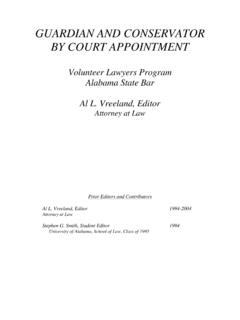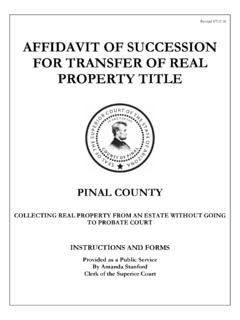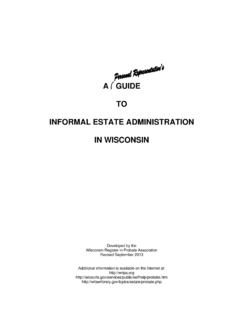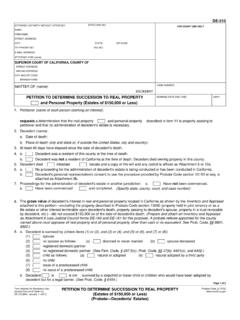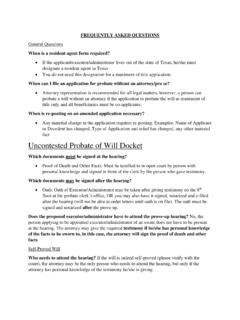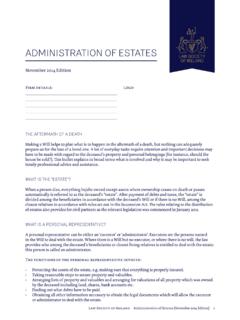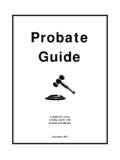Transcription of ESTATE ADMINISTRATION - alabamaatj.org
1 ESTATE ADMINISTRATION Volunteer Lawyers Program Alabama State Bar Nancy C. Hughes, Editor Berkowitz, Lefkovits, Isom & Kushner, Prior Editors and Contributors Nancy C. Hughes, Esq., Editor 1994-2004 Berkowitz, Lefkovits, Isom & Kushner, Stephen Mark Dukes, Student Editor 1994 University of Alabama, School of Law, Class of 1995 PREFACE This Manual is intended as a general overview for use in ADMINISTRATION of estates in Alabama. It should not be viewed as a thorough discourse of legal issues in this area. For example, tax issues are only briefly addressed.
2 If more detail is required, or technical issues arise, a practitioner should independently research these matters or should consider referring the client to an attorney with expertise in this area. I would like to give special recognition to Terrill W. Sanders and Lynn Belt Schuppert whose materials have served as a principal source for this manual. Nancy C. Hughes, Esq., Editor 3 ESTATE ADMINISTRATION * 1. INITIAL CLIENT/FAMILY CONSULTATION. During the attorney's initial consultation with the client and/or family of the decedent, the attorney must endeavor to obtain as much information as possible concerning the affairs of the decedent and should advise the client to bring all appropriate records to the meeting.
3 However, the attorney should never lose sight of the fact that the family has just experienced a loss. The attorney should be sensitive to the family's grieving process and should not push too hard to discuss the decedent's business affairs. On the other hand, many families seem to find solace in busying themselves with the business at hand. To facilitate a prompt and professional probate process, the attorney should obtain the following: ? Names, residences, and ages of the decedent's heirs (Ala. Code 43-8-1 (1975 and Supp.))
4 1998)1, devisees, surviving spouse, interested persons, and possible illegitimate children. ? Name(s) of custodial parent(s) or guardian(s) of any minor or incapacitated heir(s). ? Original will. Section 43-8-270 requires that after the death of a testator, and upon request of an interested person, any person having custody of the testator's will shall deliver it with reasonable promptness to a person able to secure its probate or to an appropriate court. If the will is in a safe deposit box, and the decedent's contract with the bank did not include any other authorized signatory, the bank will probably require a court order and the presence of a court representative before the box may be entered to obtain the original will.
5 ? Nature, location, and ownership of all assets of the decedent. Collect all deeds, insurance papers, checkbooks and other banking information, stocks and bonds, and pay stubs. ? List of all liabilities, including names and addresses of all creditors. Collect any mortgage notes, loan papers, receipts, and accountings of all outstanding bills. ? Tax records including income tax and gift tax returns for the last three years. ? Identity of proper person to file for Letters Testamentary, 43-2-22 and 43-2-27, or Letters of ADMINISTRATION , 43-2-42.
6 Note that if all executors named in the will are unwilling or unable to serve, and the residuary and principal legatees are unable or unwilling to serve with Letters of ADMINISTRATION with the will annexed, then the court must be petitioned to grant letters of ADMINISTRATION in the same manner as for intestacy. *Copyright 1994. 1 All code citations are to the 1975 Alabama Code through the 1998 Supplement. 4 ? Location of proper place to file for Letters Testamentary, 43-8-162, or Letters of ADMINISTRATION , 43-2-40.
7 A decedent's will must be proved in the probate court of the county in which: (1) the testator was an inhabitant at the time of his death; (2) the testator died if he left property therein and was not an inhabitant of the state; (3) the testator left assets even if he died out of the county and was not an inhabitant of the state; (4) assets of the testator are brought after his death and he was not an inhabitant of the state; or (5) the testator designated that his will should be probated if the testator owned property in such county at the time of his death.
8 43-8-162. The guidelines for determining the proper probate court in which to file for Letters of ADMINISTRATION are similar except that there obviously can be no designation. 43-2-40. ? Engagement agreement. 2. PROPERTY PASSING BY OPERATION OF LAW. probate may be avoided by certain transfers of assets defined by statute or by the terms of the instrument creating the asset. Jointly Held Property. In Alabama, interests in jointly held property, both real and personal, generally pass to the surviving joint tenant(s) upon the death of a joint tenant only if the right of survivorship is clearly stated in the governing instrument.
9 Otherwise, the interest descends and vests as if the interest had been severed. 35-4-7. However, with respect to joint bank accounts, 5-24-11 determines ownership during the lifetimes of multiple account holders. Section 5-24-11 provides for a net contribution test. If the account holders are married, and in the absence of other proof, the account is presumed to be owned 50/50. At the death of a holder, 5-24-12 provides that the survivor or survivors own the account, even if the account did not expressly provide for survivorship and regardless of whether the account read and or or.
10 Section 5-24-12 constitutes a radical change from prior law and applies to new accounts created after 3-1-98 and to existing accounts created prior to 3-1-98 unless there is a clear indication of a contrary intent . 5-24-34. Small Deposits of Less than $5,000. When a decedent leaves deposits in a bank or credit union, not exceeding $5,000 per institution, the bank may, after 60 days from the date of death and in the absence of Letters Testamentary or Letters of ADMINISTRATION , pay the deposits to the surviving spouse of the decedent, or if there is none, to the children of the decedent.
